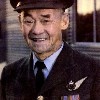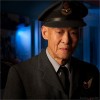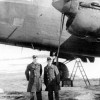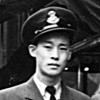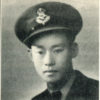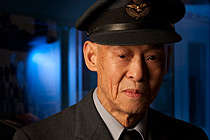
trained as a top-notch flight engineer
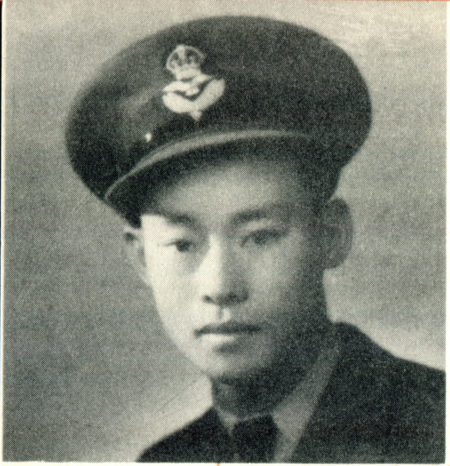
Tears glint in Gim Wong’s eyes as he dons the wool coat he wore nearly 60 years ago. The coat belongs to the uniform that marks him as what he is: a loyal Canadian. It wasn’t so very long ago that his government saw things differently.
For Wong, who’ll be 80 in two months, the Chinese head tax and the Exclusion Act aren’t just a nearly forgotten chapter in Canadian history books. They’re part of his past, part of his family’s story.
Wong was born in Vancouver’s Chinatown. His parents both came from China: his father in 1906 at the age of 15, his mother in about 1921.
She made it into the country in a brief window of time in which men could send home for brides, after the First World War and before the Exclusion Act that prohibited Chinese immigration starting in 1923.
From his parents’ villages, in fact, only three women made it in to Canada.
Anyone who hadn’t made it into the country by 1923 didn’t have a chance again until 1947, when the Exclusion Act ended. Some never came.
“Twenty-five years, the families were separated. That’s a lifetime,” Wong says.
It was the same for most of his friends growing up; everyone had relatives who were left behind.
“We never did meet any of our grandmothers and grandfathers,” he says.
Wong was born in 1922, growing up through the Depression years.
“The real miracle is the fact that I even grew up at all,” Wong says.
His family, like many others of the time, lived in the poorest of conditions.
His father ran a laundry, and the family lived at the back in a small structure built of a single layer of clapboard.
The roof leaked; the floor was cement; there was one cold water tap without even a sink. Indoor plumbing, of course, was unheard of: the toilet was outside in the woodshed.
At that, he supposes he was lucky. In Chinatown at the time, many men lived in small quarters – just a room shared by all the men who’d come from one village.
“Most of the Chinese families lived way below the subsistence level,” he says.
It wasn’t so much being on the bottom rung of the economic ladder. As he puts it, “We weren’t even hanging onto the ladder.”
His parents never had much money. They had to borrow $1,000 to go to Canada – a sum that would take years to pay back.
At the time, Wong recalls, average lots in Vancouver were selling for $100 each, and the equivalent of 10 pieces of property was simply far out of reach.
As a child, he remembers the arguments about money every year around Christmas time, when the family would prepare to send money back to their home villages for Chinese New Year. His mother wanted to send back $20 to each village, both hers and her husband’s.
“That was three months’ rent,” he remembers.
All around him, he saw people living in poverty who were forced to scrape out a living while trying desperately to pay back the money they had borrowed to make it into Canada.
The $500 was money that would have paid two years’ wages for an average worker – and that was for a white man.
“I’ve seen so darn much of it. I can’t tell you some of the suffering of my cousins, uncles,” Wong says.
They worked wherever they could – on farms, in canneries, in laundries. In the earlier years, it was often for no wages, but just a meal a day.
Even as late as 1941, when Wong was 19 and got a job in a cannery at the mouth of the Skeena River, things weren’t much better.
As an adult, he made 17.5 cents an hour. His younger brother, as a youth, made 12.5 cents an hour. White men doing the same jobs made 35 cents, while white youth made 25 cents.
“There was no negotiating. We accepted it. Every penny counted,” Wong says.
In another job, working on a farm on Sea Island, they’d make $1 for 12 hours’ work, and it would cost 10 cents each way to take the trolley. Many of the women walked the long miles from Chinatown and back again, just to save the 20 cents.
And these were the people expected to raise $500.
“It’s just laughable in some ways, you know,” Wong says.
Even so, he says, he could get over it. He could forgive the head tax.
But there were so many other things.
There was the Second World War, when he fought for his country. Of the five boys in Wong’s family, four served in uniform: two were in the cadets, one in the Army and Wong himself in the Air Force.
He joined in 1943, and at 22 became the youngest commissioned officer from the Chinese Canadian community.
It was during training that he discovered an aptitude for the work of an air gunner: an ability to recognize aircraft in a fraction of a second.
“We’re learning about ourselves, especially me, because we’re brainwashed: ‘Oh, Chinamen, they haven’t got the balance, they haven’t got the technical skills, they haven’t got the know-how.'”
In 1944, when the government drafted Chinese men, Wong was angered. He had chosen to serve, but he didn’t believe the government had a right to demand it.
“You draft me and I have a right to refuse, because I’m not even a citizen the way you guys have us labelled,” he says.
In fact, he and the 500-odd other Chinese men who served in the Armed Forces didn’t even have the right to vote – Chinese people had been barred from voting under legislation passed in B.C. in 1871.
They didn’t regain that right until the Exclusion Act was repealed in 1947.
Wong first voted in 1953, a full decade after he first joined the Air Force.
“Crazy, isn’t it?” he muses.
Then, in 1959, he met with government opposition again. He got married in Hong Kong, but his wife was denied immigration papers because she’d attended a Communist school in Canton in 1951 and 1952. She was declared a “Communist” and not allowed into the country.
It wasn’t until their MP intervened and they fought for a year that his wife was finally allowed in.
“Me, a loyal Canadian, I had to fight to get my wife here,” he says.
“When they granted me a few little rights, it was too late.”
Yet he’s not bitter, not really. He knows there are two sides to every story; he knows there was fear and hysteria in society at that time.
It was that fear that closed the door to Chinese immigration, once people started to worry what would happen when the men who had come over to work on the railroad and in the mines wanted to bring over brides.
“There was the rhetoric, ‘They’re going to breed like rabbits, you’re going to have Chinese all over the place,'” Wong says.
“Let’s not say it was wrong. It was no more of hysteria than interning all the Japanese in World War II.”
Still, he wants the government to acknowledge past mistakes.
Not so much for himself, but for the earlier generations: the fathers, the grandfathers, the brave young men who left their homeland to search out a better life for their villages by working in the gold mines, on the railroad.
“We’re doing it for our forebears. They would rest easier,” he says.
“We witnessed their suffering, their despair, their homesickness.”
Wong says it’s important to get the issue addressed, before all the people it affected pass away. His parents’ generation is gone; his own is already disappearing.
There are many for whom the wrongs will never be righted.
One of them he remembers clearly is Wing On Wong, a cousin.
He came to Canada at the age of 11 or 12, he served in the war all over the world and won a dozen medals for his efforts.
He, too, had to pay the head tax. He, too, faced years of not being considered a full citizen, despite his service to his country.
Wong remembers sitting with Wing when he was dying, and Wing making his request: “‘You tell Mulroney I fight for this country, I pay the head tax, we low man on the totem pole. I die, I want military funeral. Make sure they play the bugle.'”
Wong stops, shakes his head, his eyes welling with tears.
“Wing didn’t get any of that. He didn’t get a damn thing.”
Wong believes the government must acknowledge that the $23 million it collected from the Chinese head tax was unjust.
“Taxes belong to the people that pay them. The $23 million that was collected did not benefit those taxed at all.”
But at its heart, it’s not about the money.
“The symbolic apology is long overdue,” he says. “An apology does not cost anything. All it takes is a bit of generosity and compassion and soul-searching.
“Even a straight refund of $500 would be symbolic enough, and put it behind us.”
He isn’t sure what will come of it all.
But he will continue to do his part. He will speak out when he’s asked to. He will tell his story in the hopes it will be remembered. He will don his uniform to volunteer with the Chinese Veterans’ Association, to attend Remembrance Day ceremonies.
He will button up his coat with pride.
And he will sing O Canada.
Because this is his home, his native land.
His name is Gim Wong, and he is Canadian.
Julie MacLellan,staff reporter, Burnaby Now, Nov 6 2002
Gallery
- Gim Wong
- Gim Wong and his Halifax bomber
- PO Gim Wong circa 1945
